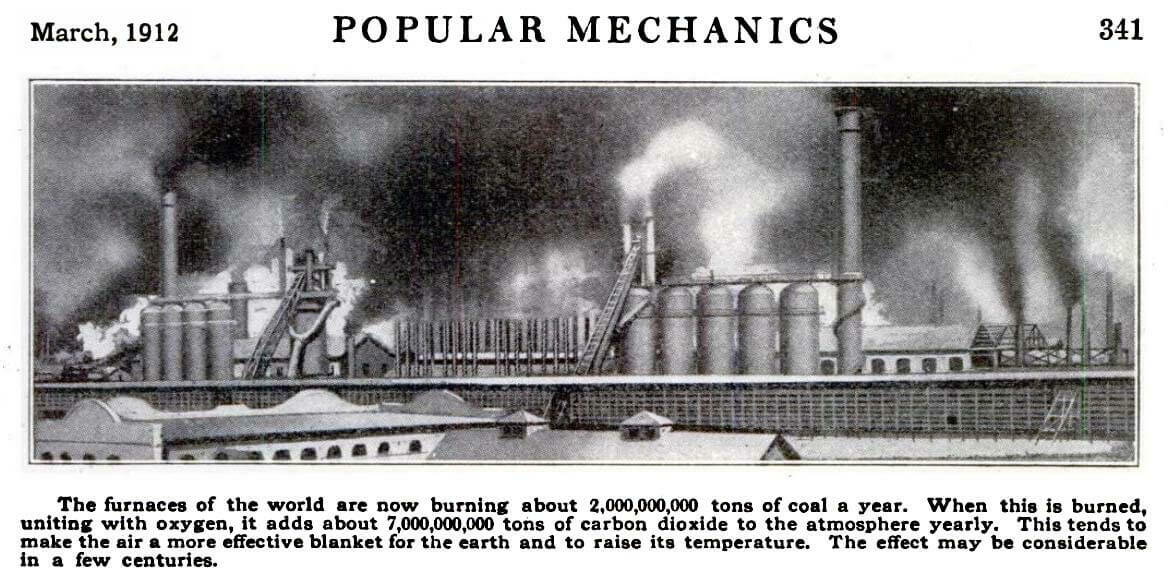Considering we can’t even get heads or state or imagining-they’re-heads-of-states to not:
- Wage war on neighboring countries.
- Try to usurp their own government.
- Promote wild conspiracy theories.
- Be ragingly against personal freedom even in the US, the countries that is supposedly all about that.
- Be ragingly anti-intellectual.
… I really have exactly zero hope we can do shit-all about climate issues. We can’t even handle far smaller and far more benign (by comparison) issues on a national level, what hope do we have to handle things that require everyone to pull in the same direction, on an international one.
… I really have exactly zero hope we can do shit-all about climate issues. We can’t even handle far smaller and far more benign (by comparison) issues on a national level, what hope do we have to handle things that require everyone to pull in the same direction, on an international one.
you wanna hear something even more depressing? people first started talking about the greenhouse effect (though it wasn’t called that,) in 1824. (Fourrier and Pouilett were the first two. Fourier in 1824, and pouillet in 1836 or so,). In 1896, we have the first scientist getting concerned about it. that credit goes to Svanta Arrhenius.
Oh. and Popular Mechanics ran an article about it being a problem in 1912. complete with this picture:

In short. We’ve known for over a century and still fucked the earth up.“A few centuries… That’s next week’s problem. No one I ever know will be alive to see that.”
How many trees did you plant this week? I planted around 10 so far.
That’s impressive, though I don’t really get what that has to do with my post. In fact I was sure you had replied to me in that topic about Ecosia from the other day. 😅
Yes, actually I think that was me.
Good for you, top effort. That’ll have exactly 0 affect on the climate crisis though…
See this is such a unique problem. We really should be happy for anyone doing anything to try and mitigate the issues we are seeing and even small acts like planting trees or me letting wildflowers and native plants grow in my yard is better than nothing…
But also on the scale we are at it does only enough to make a very small local subsect of creatures better off and does nothing for the big ticking clock overhead. We should praise andly activity but try to be aware of the need to go further and do more but we lack the ability.
It’s like this endless spiral of people priding themselves on fixing issues to get a sense of relief from the reality and is it kind or cruel to point out the forest instead of the tree people are focusing on?
What are you doing about it rather than being a keyboard warrior netizen then?
What is it about trees? Any time someone posts something about the problems of some plans to fight climate change on Lemmy or Reddit, someone posts a reply like yours. And every tine news about climate activists are posted, someone else posts something about that they had better planted some trees. Planting trees is a commendable effort and a great first step, but you do know that (if I understand earth’s climate history correctly) earth was covered in trees when CO2-levels were as high as today or even higher? Only by sequestrating fallen trees underground through sedimentation (and converting them to coal and later oil) did CO2-levels in the atmosphere begin to drop.
I make biochar, how much biochar have you made this week?
You also suck oxygen.
I am actively doing something rather than sitting around being a keyboard warrior netizen. Are you actively doing anything other than criticism of people taking proactive roles?
I live in a tiny apartment in the middle of a city.
Where the fuck would I make biochar.
A community garden.
I have a real issue with this.
We have been (detrimentally) geoengineering the climate for centuries by pumping out co2 and that has been done by nations wherever and whenever they have wanted.
If a country wants to start a program of beneficial geoengineering why should that be stopped?
It might backfire and cause more problems.
Excuse my ignorance but with the way things are going. It’s doesn’t look like we have much to lose.
Do you remember hearing about Tambora, Krakatoa and their global effects? Do you remember ozone crisis? How we found out about the severity of the impact lead had on people? Acid rain? Nuclear winter?
Effective and thus extensive geoengineering requires an understanding of biogeochemical processes that we don’t have.
Well we didn’t solve those by doing nothing. And given how unwilling we seem to be in reducing our footprint. I’d say this is our only viable way.
The only way is endangering food supply and if we stop we might have hyper climate change?
Nuclear winter didn’t happen and the jury is out of it could happen that way. Everyone knew lead was bad but the thought was because it was heavier than air the dust would settle quickly, tests in real life conditions showed that it didn’t. The ozone thing yeah give you that.
But we HAVE so much to loose. At the moment, even a worse case scenario is one when earth goes on and adapts. Even humans would likely survive. And it’s not even decided we’ll get that.
But as proven time and time again by the shitty predictions we are getting, we don’t have anything close to a true understanding of the systems in which we live.
So on top of that, you’d prefer a single nation, most likely with economic interests well active in their decision making, to try and forcefully modify the system we don’t really understand?
Count me out.
I would love to live in a world where a few powerful nation did have such influnce that their economic interests didn’t screw over the world. But i was born in a world like that.
At the moment, even a worse case scenario is one when earth goes on and adapts. Even humans would likely survive. And it’s not even decided we’ll get that.
What makes you think this? Do you have a source for this? I am genuinely curious here.
Because we could eat phytoplankton and moss which could take care of oxygen production. We couldn’t swim in the oceans or spend much time outside but we create digital fake worlds for ourselves.
Humans are unfortunately and fortunately very scrappy inventive creatures that a lot would have to happen to completely wipe us out. It’s not to say the future wouldn’t be miserable and unlike anything we currently know but the will to keep on living is very strong on average.
It’s unlikely and pretty hard to get a runaway Venus effect on earth but not impossible, but it would be likely to restabilize at some point and life would go on. It takes a lot of effort to sterilize a planet even if not nearly as much to fuck with its balance.
How? All the ideas that are being looked at come from natural cycles that are being exploited. No one is talking about releasing some chemical that no one understands up there they are talking about causing algae blooms, inducing acid rain in the middle of the oceans, and painting stuff white. This isn’t cutting edge. Also it isn’t a one and done deal, it will require constant infusing of cash.
We know that sulfur and dust in the area lowers temperatures. The experiment has been run before. Look at average temperatures and see what happens around the WW2 era where steel has to be made using cheap dirty sulfur rich coal quickly.
We know painting stuff white makes it reflect more energy.
We know that alga eats a lot of carbon and sinks. We also know that alga is always limited by a few trace elements it can’t get enough of.
None of this stuff is new. All of it is going to cost a fortune every single year. Presumably if somehow someway painting stuff white made things go crazy we would stop spending tax dollars on it.
Because we don’t know wtf we’re doing when it comes to geoengineering?
You are right, best do nothing as we slowly die.
We know what we need to do (stop using fossil fuels for starters), but corporations and governments won’t do it, so yeah, we’re probably pretty screwed.
Also consider climate cycles such as ice ages. Imagine a coalition finds a wildy successful heat reduction strategy and it impacts well beyond what was anticipated? How would things go if we accelerrated glaciation down to the gulf of Mexico? The Earth’s wobble and axial tilt are part of this process over incredible periods of time… CFC’s and the ozone are a good example of rapid and unanticipated results of human inputs. No easy answer even with stakes as high as they appear.
Do we know what will happen if do nothing?
I’m not arguing to do nothing, just attempting some clarity on the broader strokes of the issues. Much of our understandings of natural processes are still immature and incomplete - appreciating that fact should be a guiding principle for any near-to-hand actions.
Luckily, we’re experts at rising the temperature. If we accidentally bring in the next ice age early, it’s back to coal.
Well except we burned a shit ton of it already and could struggle to burn enough without seeding thicker clouds thus making the glaciation worse.
Part of the problem is cloud coverage acts as a reflector and if you get enough of it how do you get clear skies again? To stop it?
Agreed. Hell, when we decided that the global shipping industry should not use the dirtiest fuel possible, the lack of sulfur oxide being emitted raised the ocean temperature quite a bit almost immediately. There are things we can do that will have the same effect without the massive negative consequences that sulfur oxide carries.
Well they are allowed to use it they just have to use scrubbers and even then it is the conditions of the water and how close too shore. It was to stop acid rain.
We know what we did to cause the problem. Anything we do to mitigate the effects of what we did will only encourage us to continue making those same mistakes.
Forget carbon offsets, just reduce carbon emissions and greenhouse gases. Forget geoengineering and carbon capture. Just tax emissions and budget for carbon neutral infrastructure and reducing car dependence.
Anything we do to fix the climate that doesn’t stop us from screwing up the climate will only enable further mistakes.
Yeah, carbon offsets amd the whole carbon footprint ullahit are just businesses blaming the public to deflect attention so they can keep on doing whatever they want. Just like blaming the public for water shortages when the vast, vast majority is used for industry.
This is the best summary I could come up with:
Geoengineering is highly controversial, but discussions of its feasibility are gathering pace as the impacts of extreme weather, driven by climate breakdown, grip the planet.
Governments should also allow academics to investigate the possibilities of geoengineering, chiefly in the form of solar radiation management, which involves attempting to reduce the amount of sunlight striking the Earth’s surface, for instance through whitening clouds to be more reflective, or setting up mirrors in space.
“Geoengineering, like direct air capture, is a deeply uncertain techno-solution that fossil fuel executives love to push to take pressure off their core business of selling oil, gas, and coal, which, as more and more people are realizing, is causing rapid and irreversible destruction of our planet’s habitability,” he told the Guardian.
As a climate scientist, my worst nightmare is continued fossil fuel expansion accompanied by solar geoengineering followed by termination shock.
Mark Maslin, professor of earth system science at University College London, who was not involved with the panel, said many scientists had strong feelings on geoengineering.
He added: “A strong international moratorium against solar radiation management is required, to ensure no country or company tries to ‘fix climate change’ with disastrous consequences.”
The original article contains 938 words, the summary contains 196 words. Saved 79%. I’m a bot and I’m open source!
Can’t wait
I’m going to assume they aren’t counting industry in that.
Look! My solar panels are 23% efficient! 😀
And what happens to the other 77%? It turns into heat! 🥵
If your panel was not there, what % would turn into heat?
Depends: Did you whitewash your roof?
Don’t forget that solar panels also displace other energy sources, such as burning coal.
How much heat does that produce? And then there’s co2…
For the right price, I’d buy them. But they’re not the World’s panacea - just a medium term fix, not to be over used.
I don’t have stats on hand but its much less than 77% of photons “turning into heat”.
Those photons do lose some energy which is kinetic and becomes heat but it’s not 100% either, as those photons mostly just bounce off after losing a little energy.
Solar panels appear dark - more so than a 23% reduction can account for. The whole of the other 77% will not immediately turn into heat, but the bulk of it will. Some photons bounce, with a dependence on colour - but what happens to them then? A tiny amount will escape the Earth, with the rest absorbed by objects, atmosphere and eyes - mostly becoming heat. And what happens to visible light when it loses “a little energy”? It becomes infrared - y’know: heat.
Look I don’t agree with your comment being downvoted but my statement is broadly correct though I don’t have the numbers to back it up.
You’re also correct that the photons are likely to bounce around and impart more of their remaining energy within our world/atmosphere.
That would happen with most objects (barring perfectly reflective surfaces and even then) such as a roof though…. So it’s not like your solar panel is increasing the total energy imparted to the “system”.
Indeed it doesn’t increase the total energy. It converts much of it into energy that our excess CO2 traps - IR. So we must either leave it as visible light, or push technology to convert it into microwave, both of which can escape.
And use what exactly for energy generation? Covering even 5% of the planet in solar panels would be less disastrous than continuing with fossil fuels.
Your proposal also isn’t mutually exclusive with solar power. You can do both… absorb light for electricity generation and efficiently reflect light to reduce total absorption.
Both would kill us, so it doesn’t matter which passes the finish line first. This is what the article warns about - massive engineering projects that affect the climate, whether for the purpose of geo-engineering or not.
Nothing wrong with solar IF we can pump the heat out of the atmosphere, or dodge it in some other way. Which we can’t, yet, and a solution to this is not waiting around the corner.
















